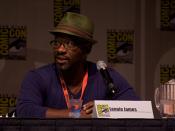Theme:When an individual in our society is confronted with seclusion and desolation, the individual expresses actions of desperation and distress, only desiring a sense of companionship.
Point of View:The point of view in Of Mice and Men is Third Person Omniscient. Throughout the whole story Steinbeck limited himself to only revealing what one would see in a play, the actions and dialogue of the characters, with chapter six as an exception. Chapter six is an exception because of Lennie's hallucinations of the rabbit and Aunt Clara, which were put there to create a sense of pity for the audience, even after Lennie had killed Curley's wife. The other chapters were limited to actions and dialogue because if all information, thoughts, and ideas were to be given to the audience then there wouldn't be much of a story. Everyone sees or thinks differently and Steinbeck created space for that to happen allowing the audience to make their own connections to the story.
Prediction: After Lennie's death, George would have stayed at the farm in Soledad meaning loneliness in Spanish. That's just how he would continued to live, and without Lennie there to mess things up and make him lose his job, he would stay. Candy was still willing to go on with the dream even though Lennie died so he and George tried to pursue their dream after several more months of work. It seemed as though they reached their dream but George feeling lonely and miserable started drinking and spent all he made on poker games and a "cat house". He ends up dying alone and with nothing.
Title:The best laid schemes of mice and menGo often askewJohn Steinbeck's title came from this line in Robert Burns' poem "To a Mouse" Just this line reflects a great deal about the book. George and Lennie had planned their future, hoping to have a home, but because of unfortunate events (Lennie commits murder) their dream was ruined, just as the mouse's home was by the farmer's plough. Within the piece you could make connections between the mouse and Lennie who both ended in tragedy and misfortune.
Obscenities and Violence:Obscenities and violence only enhance the quality of the work in which they add a higher sense of despair to the story and they emphasize on the inner complexions of the characters. The worker's sense of violence created distrust and an even higher sense of loneliness to the book. The violence of characters highly accentuated who they were. Lennie was unintentionally violent killing the mouse, puppy, and Curley's wife. This revealed that he had no control over his strength. Curley must have been the most violent because he was always looking for trouble among the ranch hands, especially towards bigger men. When Lennie unintentionally hurt his hand, Curley immediately wanted revenge making his desire to shoot him in the stomach with a shotgun obvious. Carlson is another violent character as well. He demonstrated no sympathy for Candy's dog and immediately went to shoot him. Carlson was also somewhat happy to join the hunt for Lennie. He also said the last words of the book "Now what the hell ya suppose is eatin' them two guys?" He showed absolutely no concern for George after he had killed him.
Analytical Observation:An observation I made was that of when Lennie, Crooks, Candy, and Curley's wife were in Crooks' room. "They left all the weak ones here" is what Curley's wife said when she saw who was there. Those in Crooks' room were a "nigger", a "dum-dum", a "lousy ol' sheep", and a "tart". They are all examples of people who in society are alienated in some way, in this case race, mental retardation, age, and gender. During those times this sort of separation and injustice was very great where the white, educated, young man was superior.
Sources Consultedwww.freebooknotes.comOf Mice and Men by John Steinbeck"To a Mouse" by Robert Burns





